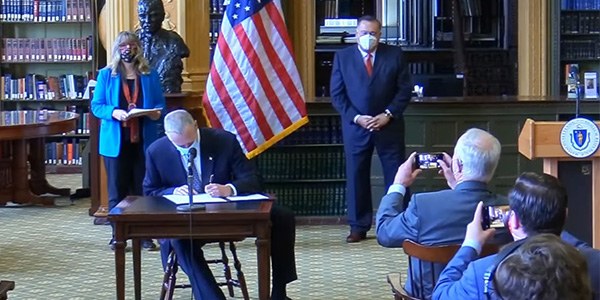Massachusetts Gov. Charlie Baker signed a wide-ranging climate bill into law Friday after months of back and forth between the executive branch and the legislature.
The House and Senate passed the final version of the bill with more than 40 amendments from the governor’s office.
“This is it,” Baker said at the ceremonial signing. “We’re going to sign this after a lot of hard work.”
The law requires that Massachusetts meet an interim emissions reduction target by 2025, along with new interim goals every five years to hit net-zero emissions by 2050. The secretary of the Executive Office of Energy and Environmental Affairs (EEA) is also required to set emissions limits for specific industries, including natural gas.
Given the magnitude of the responsibilities delegated to state agencies by the new law, legislators are now concerned that the governor’s budget proposal for 2022 does not go far enough to support those agencies.
Baker’s preliminary budget of $46 billion allocates $293 million for the EEA, a 6.2% decrease from fiscal year 2021. The Department of Public Utilities (DPU) has $20.8 million allocated for 2022, the same amount as its current budget. The Department of Energy Resources is also set to receive a level amount of $4.5 million.
The state will need to increase its staff considerably to oversee the implementation of emissions limits on major sectors of the economy and meet the reporting requirements of the new law, Sen. Michael Barrett said during a budget hearing last week.
The law becomes effective 90 days after the bill’s signing and just before the start of fiscal year 2022 in July.
Each limit requires the development of a “comprehensive, clear and specific plan for realizing” the law’s goals Barrett said.
EEA Secretary Kathleen Theoharides said she agrees that “much more additional work needs to be done,” but the agency is “well equipped” to ramp up its current processes to implement necessary changes.
Implications for Utilities
Barrett is also concerned about the DPU’s role in regulating natural gas emission reduction targets. The climate law requires the department to make reducing emissions one of its main goals, in addition to affordability and reliability.
But utilities still rely on natural gas as a core business. Eversource plans to grow its investments in the carbon-emitting fuel through 2025. By then, natural gas will make up 22% of the utility’s energy distribution, compared to 12% in 2019.
The senator questioned DPU Chair Matthew Nelson at the budget meeting about whether the department had enough support to regulate an industry with a “deep-seated determination to resist change.”
“We don’t want to enact a policy that is going to harm customers or take away heat from peoples’ homes,” Nelson said. “But if utilities bring us a proposal that is not in line with the law, we will make that determination and correct any mistakes that are hypothetically made.”
A spokesperson for Eversource told NetZero Insider that more than 1.5 million homes rely on gas for heating and cooking in Massachusetts, and it is the “least expensive residential energy option.”
“To that end, we have an obligation to deliver safe, reliable natural gas service to the communities we serve,” while exploring new pathways to achieve net-zero emissions, such as geothermal, renewable natural gas and hydrogen, the spokesperson said.




